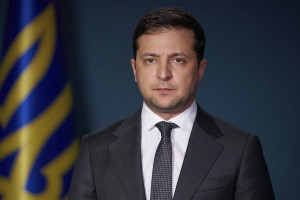Bloomberg learned that EU ambassadors did not agree on a package of sanctions against Russia

 PIONEER MEIZHENG BIO-TECH (5 in1) JC0871/ Rapid tests for the determination of the residual amount of β-lactams, tetracyclines, chloramphenicol, streptomycins, ceftiofur in milk, whey.
PIONEER MEIZHENG BIO-TECH (5 in1) JC0871/ Rapid tests for the determination of the residual amount of β-lactams, tetracyclines, chloramphenicol, streptomycins, ceftiofur in milk, whey. PIONEER MEIZHENG BIO-TECH (5 in1) JC0586 - Antibiotic tests 5 in 1 / Rapid tests for determining the residual amount of β-lactams, tetracyclines and cephalexin in milk, whey
PIONEER MEIZHENG BIO-TECH (5 in1) JC0586 - Antibiotic tests 5 in 1 / Rapid tests for determining the residual amount of β-lactams, tetracyclines and cephalexin in milk, whey
EU permanent representatives met on May 8 to discuss new sanctions against RUSSIA, but did not reach an agreement, BLOOMBERG reported, citing sources familiar with the meeting. Negotiations will resume in the coming days.
The European Union is developing the sixth package of sanctions related to the conflict in Ukraine. The HEAD of the European Commission, Ursula von der Leyen, said that it is planned to include the refusal of Russian oil by the end of 2022, as well as the disconnection of a number of banks (including Sberbank) from SWIFT. In addition, Bloomberg and REUTERS reported that Brussels is proposing to ban European courts and companies from providing services related to the transportation of Russian oil to third countries.
In order for the package to be adopted, all 27 EU countries must agree on it, but, according to Bloomberg, the meeting participants failed to get Hungary's consent to a ban on Russian oil imports. In addition, Greece and Cyprus have not yet agreed to restrictions on oil transportation, the agency's interlocutors say.
Bloomberg learned about G7 plans to discuss sanctions against Russia with Zelensky Politics
Hungary has previously stated that it will not support the abandonment of Russian oil. Foreign Minister Peter Szijjarto said on May 6 that Budapest would not allow the EU to impose an embargo on Russian oil , so as not to "destroy the results of the many years of efforts of the Hungarian people."
The May 8 meeting is not the first in which the ambassadors of EU member states failed to agree on sanctions. On May 4, Reuters reported that at one of the meetings, in addition to Hungary, concerns about such restrictions were expressed by Bulgaria, Slovakia and the Czech Republic. On the same day, Bloomberg wrote about the doubts of Greece, Malta and Cyprus regarding the transportation ban.
According to the agency, the EU, as a compromise, proposed extending the deadline for phasing out Russian oil until the end of 2024 for Hungary and Slovakia and until June of the same year for the Czech Republic.
Read on RBC Pro Pro Strength test:how to legally turn down a candidate for a jobHow the relevance of digital assets and currencies is changing Articles Pro The EU wants to disconnect Sberbank from SWIFT.What this means for the bank and its shares Forecasts Pro “Already abroad, but I can recommend a friend”:how to contain the outflow in IT Instructions Pro How non-residents can be issued from Russian shares and what will happen to the market Articles ProWhy software import substitution in Russia will go the way of the Belarusian shrimpwhen to agree ArticlesPresident of Ukraine Volodymyr Zelensky called on the European Union to "take a unified position" regarding anti-Russian sanctions.
Favorable course inFavorable exchange rate at VTB officesThe larger the amount, the greater the benefit.More than 1,000 branches across the countryPreliminary calculation inonline converterRead together with it:
- The IEA sees a risk of a decline in oil production in Russia due to sanctions.The IEA sees a risk of reduced oil production in RUSSIA due to US sanctions , but maintains its production forecast. According to the IEA, Russian oil exports will remain unchanged.There is a "significant downside risk" to Russia's oil production forecast due to US sanctions, the International Energy Agency (IEA) said in a report.BLOOMBERG . The agency's experts believe that the latest US sanction...
- UniCredit заявил о галактических усилиях из-за санкций против РоссииUniCredit старается не нарушить «более 15 тыс. санкций», а также не «совершать ошибки», которые позволят изъять его активы в России, заявил гендиректор. После начала военной операции банк начал рассматривать возможность ухода Итальянский банк UniCredit прилагает «галактические усилия», пытаясь соблюсти международные санкции в отношении своего российского подразделения. Об этом заявил генеральный д...
- В Тульской области уничтожили 24 кг санкционных сыров и мясных продуктов из ЕвропыВо время совместной проверки с транспортной прокуратурой из оборота было изъято 24,45 кг сыров и мясных изделий, произведенных в таких странах, как Дания, Испания, Норвегия, Италия, Ирландия и Франция. Ввоз данной продукции на территорию России запрещен в соответствии с указом Президента, касающимся специальных экономических мер. Изъятая продукция была ликвидирована путем измельчения и денатурации...
- Rosselkhoznadzor has banned meat imports from two Belarusian enterprises due to violations.In addition, three other Belarusian producers are now subject to strict laboratory monitoring due to initial deviations: azithromycin was found in poultry MEAT from Druzhba Poultry Farm, and the pesticide imidacloprid was found in honey from Pchalyar Polachchyny Farm. Powdered MILK from Luninetsky Dairy Plant was also found to containcoli bacteria . These measures were taken at the request of the ...
- США объяснили снятие санкций с проекта АЭС в Венгрии с участием РоссииСША хотят, чтобы строительство АЭС «Пакш-2» завершилось, это необходимо, чтобы Венгрия стала энергетически независимой, заявил Рубио. Орбан сообщал, что после встречи с Трампом добился исключения из санкций Соединенные Штаты вывели из-под санкций проект АЭС «Пакш-2» в Венгрии, подтвердил госсекретарь Марко Рубио после встречи министров иностранных дел стран G7 в Канаде. Ранее об этом говорил венге...
